I’m being hyperbolic. The best thing I’ve ever seen is I, Claudius.
If preambles bore you, scroll down to the picture of Diego Luna where I talk about Andor. If not, stay tuned while I discuss my history with the Star Wars franchise.
I wish I could just talk about the show as it stands without going into my entire backstory regarding Star Wars. Having said that, any discussion regarding Star Wars in 2025 carries so much baggage with it that it’s necessary to point out where I stand with this series so my review of Andor has a semblance of context.
It may be hard for some to grasp this, but Star Wars used to be generally liked by mainstream audiences and nerds alike. They were three movies that everyone generally agreed were good and had innocent nostalgia for.
There isn’t a time in my life I don’t remember Star Wars not being a part of. They were always on television. I don't recall ever seeing them chronologically from beginning to end, but individual scenes always stuck out in my mind. As young as three, I distinctly remember the trash compactor scene from A New Hope, and to my underdeveloped brain, the stormtrooper disguises were Han and Luke's default costumes. I knew the characters' names and that Darth Vader was Luke's father, even if I didn't quite understand the implication of what that meant.
Christmas Day of 1995, my parents gifted me the trilogy on VHS. Before each movie, there was a brief interview with film critic Leonard Maltin and George Lucas. I had never seen any of my other tapes do that, so that told me these movies were something important. I never skipped the interviews before watching the movies and watched the hell out of them. As a kid, Return of the Jedi was my favorite. It had the biggest battles, the most planets, and a green lightsaber. I didn’t know lightsabers could be green.
In 1997, to commemorate the 20th anniversary of the first film, the films were rereleased in cinemas. Seeing Star Wars on the big screen was momentous. I loved all the new editions that were included (only as an adult would I realize that each time Lucas added something new to his films, something was lost rather than gained).
Good times kept coming. One day, I was watching some trash on TV with my parents when the teaser trailer for The Phantom Menace was shown. I had no idea another Star Wars was even in the works. Little kid me didn’t go on the internet back then. A new Star Wars was akin to finding the Holy Grail or winning the lottery. Seeing Darth Maul ignite his double-bladed lightsaber was something I simply couldn’t comprehend.
With our dial-up internet, I made my dad download the teaser for me, an endeavor which took about three hours and, to an eight-year-old, felt more akin to three weeks.
Needless to say, the movie came out, and I loved it. It was the first time I had seen a movie multiple times on the big screen. When Attack of the Clones came out, I was a little older and had internet access. I became aware of just how critically aligned the first film had been. I watched the second one, and within minutes, something felt off, even if young me wasn't up to the task of articulating exactly what. I told myself I liked it because how could something Star Wars-related be bad?
In any case, it wasn't a big deal as Lord of the Rings had replaced Star Wars as my obsession.
Many people from my generation and current youngsters have a lot of nostalgia for the prequel era, especially Revenge of the Sith. Hundreds of YouTube video essays (I hate that title) go to the ends of the earth to defend the movies and explain how they're actually secretly brilliant. Look, I don't hate these movies, but they are not good. No amount of nostalgia or lore or spin-off books or TV series can make up for the terrible dialogue, bad acting, stilted directing, and unhinged ideas from George Lucas. Having said all that, that doesn’t mean I can’t have fun with those movies. I enjoy watching them, even if not always for the right reasons. Beyond the movies themselves, the behind-the-scenes featurettes are phenomenal (of course, they don’t touch a hair on the Lord of the Rings documentaries). I find George Lucas endlessly fascinating. It's amusing watching him interact with members of the crew and actors. I love his unhinged ideas. I also love some aspects of the prequels, even if the execution wasn't always great. Ian McDiarmid as Palpatine is absolutely delightful. A fun performance in movies that somehow managed to make Samuel L. Jackson boring. I also like poor Hayden as Anakin. It's not his fault; besides McDiarmid, nobody came away from those movies unscathed by poor line deliveries.
The second time I'm sharing this Phantom Menace documentary
The Force Awakens came out, and I initially liked it, even if something felt off. The Last Jedi came out, and the internet collectively lost its mind. It's precisely because of this movie the internet became full of terrible YouTube grifters like The Critical Drinker, who make ten to fifteen identical videos about why a movie is bad because it has a black woman in it.
Things people forgave in previous movies (sound or things falling in space) suddenly saw YouTubers making eight-hour-long videos about how bombs falling in space is stupid. Therefore, The Last Jedi is the worst movie ever.
There are some questionable moments in the movie. Finn's subplot is bad; overall, Rian Johnson did him dirty. However, all of the stuff with Kylo Ren was well done, and I don't really care if Holdo's lightspeed ramming her ship into Snoke's fleet is lore-breaking; it was visually interesting and a spectacular moment on the big screen.
I hated Rise of Skywalker. It’s the only film in the franchise that actually angered me. Yes, Attack of the Clones is bad and inept in many ways, but it’s George’s vision through and through in all its terrible glory. Rise of Skywalker has no vision. It's a film made by a committee that took zero risks. By trying not to upset anyone, they appeased no one. The action is unremarkable and derivative; all of the reveals are underwhelming and cynical. It was the absolute worst of corporate filmmaking and corporate committee decisions. Watching it in the theater, I felt deflated and old. Beyond that, I was ready to let go. Star Wars just didn’t mean anything anymore.
Dozens of derivative Disney Plus shows and cartoons came and went, and I just didn't care. I wasn't angry. I'm not one of those grifters who is going to get vitriolic over a Disney product. I simply understood that what once made Star Wars special wasn’t there anymore.
I watched The Empire Strikes Back for the fortieth anniversary and still loved it. Even if the franchise has been diluted and no longer special, it doesn't retroactively detract from the original films.
With the preamble out of the way, let’s talk about Andor. My memories of Rogue One were a movie that I enjoyed but was mostly inconsequential. From the Disney era, it was the most visually appealing. The action was solid, and even if narratively the Vader scene is odd, it was satisfying. CGI Peter Cushing and Carrie Fisher were nightmares, but I liked the movie. I didn't walk away thinking, “I can’t wait to find out the entire backstory of Diego Luna.”
I mean, look at Disney’s trackrecord of expanding upon established characters. They took Boba Fett, every little boy’s favorite toy (because realistically he never had a character, he was an action figure) and finally gave us a show about him. But was the show cool? No, it featured an overweight, bald, elderly man with dentures struggling to fit inside the awkward costume.
To me, Diego Luna was just the guy with all the weird sex scenes from Y tu mama tambien. So when Andor was announced, I could not care less. I wasn't being coy or edgy; I simply had no room in my life for anything to do with this franchise. It was no longer about telling a story but about Marvelesque-connected universes, fan service, and milking every character, planet, and concept dry. When you abuse something to such an extent, it loses all meaning.
Curiously enough, reviews for Andor started to come in, primarily for the first couple of episodes, and they unanimously called the show good. Then, the reviews for the next couple of episodes came out, and they were calling the show really good. I started to look into showrunner Tony Gilroy. I knew very little about him. He wrote The Devil’s Advocate, a personal favorite of mine. In addition to that incredibly fun movie, he wrote the first three Bourne films. I was never quite sold by those, but they are generally well-received. He seemed to be a very typical working man who wrote competent to good scripts.
Before Andor, he had been brought along to do (apparently quite extensive) reshoots of Rogue One.
From the Hollywood Reporter:
"When Tony Gilroy joined the Star Wars galaxy to reconfigure Rogue One, he was unafraid to make the tough choices. His superpower, as he called it, was that he wasn’t a lifelong Star Wars fan, allowing him to take some big swings such as sacrificing Rogue’s main characters.”
“In every department, we’ve had all kinds of people come in, and they know it’s Star Wars, so they change their behavior. They change their attitude. They change their thing,” Gilroy tells The Hollywood Reporter. “And you go, ‘Wait, no. Do your thing. You’re here because we want you to be real.’ So it’s a testament to the potent power of Star Wars. It really gets into people’s heads, but to change the lane and do it this way, it takes a little effort.”
I interpret this as “Let’s focus on making a good story first and foremost and not worry about checking the appropriate and expected Star Wars boxes.
With my curiosity piqued, I watched Andor; here are my thoughts with as few spoilers as possible.
Going in, I really didn’t know what to expect. I didn’t know what story was being told or what the themes would be. I knew it was about the second lead of Rogue One who had little development beyond being a rebel who will kill informants for the greater good.
The first episode starts with Cassian Andor on a Blade Runner-looking planet full of rain and neon. He ends up at a brothel looking for his long-lost sister. He catches the attention of two low-level corporate security officers who try to squeeze him out of some money. Cassian gets the better of them, killing them and escaping, but this double murder is the catalyst for the entire show and sets in motion an avalanche that can’t be contained.
Nobody in the corporate security offices seems to care that two of their employees were murdered. To them, it's all just annoying paperwork, but one junior officer, whose ambition far outweighs his talent or abilities, looks into the affair. This is Syril Karn, an actor I hadn’t heard of but who gives big Kyle McLachlan vibes.
Cassian lives on a planet populated by people who would be at home in season 2 of The Wire. We learn that Cassian is quite reckless but also good at stealing things, which attracts the attention of Luthen (Stellan Skarsgard).
Eventually, Cassian, Luthen, and Syril's paths cross when Syril assembles a team of about a dozen men to capture Andor; Andor and Luthen outsmart them, resulting in the deaths of several security guards as well as Andor's former girlfriend's current boyfriend.
Luthen, much more interested in recruiting Andor for something bigger than for his petty thieving, escapes with Cassian on his ship.
I almost enjoyed the first three episodes for what they didn't have and than for what was actually on screen. There were no Stormtroopers, no lightsabers, no Tie Fighters or Darth Vader. There were no memberberries or fan servicey characters. It was slow, but not in a way where the plot meanders, and the viewer loses interest. It was slow the way the first couple of episodes of The Wire are always slow. The Wire takes its time setting up the different players: the cops, the street-level dealers, the big kingpins, the politicians, the lawyers, the teachers, etc. We don't quite know how each plotline relates to one another or how they will converge, but the show takes time to set up all the pieces, and every component matters.
I was pleasantly surprised at how much I enjoyed the first three episodes. I wasn't head over heels with the show, but it hadn't done anything egregious either. It wasn't until the show's second arc (episodes 4-6) that I wasn't only in love with it but already calling it one of the best things in the Star Wars universe with no hesitation.
The second arc takes place on a planet that looks remarkably like Scotland. A tiny group of insurrectionists are planning to rob an Imperial outpost's quarterly payroll supply. At this point in the lore of this franchise, there is no Rebel Alliance. The rebels are a fractured group of mostly ineffective resistance fighters, some more radical than others, but none of them a big enough threat to the Empire to make the Empire care or take the threat seriously.
These three episodes really take their time. For two whole episodes, there is no action at all. I can see this type of storytelling annoying the average Star Wars fan, but seeing as the average Star Wars fan is a crybaby imbecile, that’s fine.
The show does a fantastic job setting up what the stakes are and what each role the members of the strike team have. There is very little chance of the plan actually working, and even if it does work, there's little chance the team will survive.
It is also during these episodes I begin to understand what the show is about. On the surface, this franchise has been about good versus evil. The themes of the original trilogy weren’t overly complex. They told the classic hero’s journey while taking liberal inspiration from the Second World War, the Vietnam War, Dune, and Kurosawa films. It worked. Lucas presented a fantasy space opera epic in a digestible way that audiences had never seen before.
The prequels, even if the execution wasn't always there, were strong thematically. How corruption and complacency can lead to dictatorship. A charismatic, strongman leader can accumulate power and violate laws with popular support (thunderous applause) until it's too late. It showed the fragility of democracy and how it tends to destroy itself from within and not from without.
What the hell were the sequels even about? I mean, they were about Disney using the Star Wars IP to make billions of dollars and weaponize the nostalgia for the original films. But what were the films about? What were the themes? Damned if I could tell you.
In A New Hope, the classic cantina scene does so much more than just act as a backdrop to show silly aliens and creatures. It depicts Luke (as well as we, the audience) stepping into a larger world. The universe exists outside of Luke and his immediate wants and desires. Life is happening beyond the plot we are watching. The sequels failed to evoke this feeling. Beyond the immediate story of the fight between the good guys and the bad guys, I get the sensation nothing else is happening in the rest of the universe. None of it feels lived in. Only the battle of our heroes and villains exists. I'm sure someone out there will tell me about the deep and complex themes of the sequel trilogy, but I'm not listening.
Andor is about something. It’s one of the best pieces of anti-fascist media I’ve ever seen. Something no other piece of Star Wars media has ever managed to do (and I’m including the original trilogy here) was show just how scary the Empire is.
Beyond Darth Vader and the Emperor, the Empire was cannon fodder for the good guys to get through to move the story forward (Battle of Hoth is exempt from this analysis). Andor really emphasizes what living under the yoke of the Empire was like. Punishment without due process, arbitrary laws and orders, abuses of power, oppression of the small folk.
In episodes 7-9, General Hux was a cartoon character. We were never afraid of him. The second arc of Andor introduces the characters of Dedra Meero and Major Partagaz, officers who work at the ISB.
(No one in history has ever pulled off a better resting bitch face)
(The Empire recruited all the best hairstylists)
They quickly become two of the most compelling characters in Star Wars. They don't act like cartoon movie villains. They are cut from the same cloth as Grand Moff Tarkin. They are the villains because of the threat they represent. They are good at their job, and every decision they make, while for the greater good of the Empire, puts our heroes in danger and adds to the suffering of the already oppressed. They believe they are on the right side of history because they are indoctrinated and committed. Anything that goes against their status quo is an act of insurrection and needs to be squashed.
Deedra is frustrated because she believes the small rebel ambushes and stolen Imperial goods point to a larger, organized threat than minor nuissances. She believes one person (Axis) is at the center of this and wants resources to find him. Axis, without the audience explicitly being told, is Luthen.
The dialogue is on point. All of the meetings with the ISB officers and their bickering and constant trying to one-up one another reminded me of the best bits of Game of Thrones before the show went to shit.
Among the rebels Andor has linked up with to do the heist is Nemik, a young, idealistic, likely naïve member of the group who's a true believer in the cause. Up to this point, what we know about Cassian Andor is that he is a survivor. He doesn't look at the big picture and just tries to survive day to day. He doesn't like the Empire but has accepted it as the status quo. Nemik is not that. Nemik is working on a manifesto to explain the evils of the Empire and how totalitarian regimes emerge and gain traction. Nemik states the themes of the show better than I ever could, so I'll share them here:
There will be times when the struggle seems impossible. I know this already. Alone, unsure, dwarfed by the scale of the enemy.
Remember this, Freedom is a pure idea. It occurs spontaneously and without instruction. Random acts of insurrection are occurring constantly throughout the galaxy. There are whole armies, battalions that have no idea that they’ve already enlisted in the cause.
Remember that the frontier of the Rebellion is everywhere. And even the smallest act of insurrection pushes our lines forward.
And remember this: the Imperial need for control is so desperate because it is so unnatural. Tyranny requires constant effort. It breaks, it leaks. Authority is brittle. Oppression is the mask of fear.
Remember that. And know this, the day will come when all these skirmishes and battles, these moments of defiance, will have flooded the banks of the Empire’s authority, and then there will be one too many. One single thing will break the siege.
Remember this: Try.
In a show of great, memorable lines, the one from Nemik's manifesto that really struck a chord with me was, "And remember this: the Imperial need for control is so desperate because it is so unnatural. Tyranny requires constant effort. It breaks, it leaks. Authority is brittle. Oppression is the mask of “.
That's precisely it. Unlimited power is a fragile thing because it can only exist at the expense and exploitation of others, and whether it takes a week, a month, or ten years, its downfall will always be inevitable and ugly.
The heist is a success but at the cost of nearly every member of the crew. The way the scene plays out is also indicative of how show handles action. While the action is spread out and not always on a huge, epic scale, it always matters. There are always stakes and we know that even if the good guys succeed, it won’t be without loss. Everyone feels vulnerable. No one is given a glorious, drawn out death scene. It happens randomly and coldly. More than taking money, the goal of the heist was a psychological blow to the Empire. It showed they weren't invulnerable. It became galaxywide news, treated as a terrorist attack, but it showed the resistance wasn't to be relegated to petty crimes.
Luthen, who organized the attack, couldn't be happier. His allies are less optimistic than he is because they see the aftermath. The Empire will have no choice but to strike and to strike hard. That's what Luthen wants. His heart is in the right place, but he's willing to get his hands dirty for the greater good. For him, the Empire represents the ultimate evil of the universe, and to defeat it means adopting evil methods. The Empire will strike back, and it will cost countless lives, but that's precisely what's needed to get citizens out of their apathy.
Authoritarian regimes throughout history have so successfully taken over societies because they do it slowly. The average citizen thinks so long as their life continues as usual, then things can't be that bad. It isn't until Dresden is being bombed or your children are being called to fight that you realize you waited too long to act. Luthen is counting on this. He's counting on Imperial counterattacks to wake people from their apathy and see the true nature of the Empire.
In this batch of episodes, we meet Mon Mothma. She's a legacy character who appeared in Return of the Jedi for all of thirty seconds but made an impression due to her remarkably long neck and air of authority. Genevieve O'Reilly was cast to play the character in Revenge of the Sith, only for her scene to be deleted. When Rogue One came out, Genevieve reprised the role, appearing for all of two minutes. The only people this factoid was interesting to were weird losers who care about this shit. As with many things in Rogue One, she had no purpose in the film other than to remind the fanbase she existed. When she appeared in Andor, I never would have suspected she'd end up becoming one of the best characters in the entire franchise.
She's a senator from a rich, pompous culture who adheres to extravagance and questionable traditions. Publicly, she rides the Imperial line (mostly) while questioning some policies and advocating for human (?) rights. She's a nuisance to the powers that be, but nothing for the Empire to worry about.
Viewers not paying attention might not notice that nearly every line of dialogue she has means something beyond what it is on the surface. She's playing a dangerous game, trying to fund money for rebel activity without it looking like she's funding rebel activity. This means putting on a public face of the affluent aristocrat. It also means one false step and her entire life will be forfeit.
Mon and Luthen are both people who, on the surface, are part of the affluent Couruscant elite. They mingle with imperial dignitaries and unsavory types, but they either fund or plan rebel attacks, although their methods and philosophies differ. Mon is still hesitant to know the details or to use violence, while Luthen sees violence as the only way to beat tyranny.
These are the two best characters in the show. The original trilogy shows us the romanticized version of the Rebels. Their cause is just, and we root for them. Andor shows us the ugly reality. The Last Jedi lazily tried to invoke this theme with a throwaway scene where Benicio del Toro (why was he in that movie) shows that the same dealers are selling arms to both the good guys and bad guys. That theme is never explored again, so why bother?
Everything Luthen does is dirty. He’ll kill an employee if they are a loose end. When he meets with Forrest Whitaker’s character, one of the fringe radical group of rebels, he explains the necessity of letting other rebels die.
The Imperials are aware of a planned rebel attack. Luthen, in his power to warn these rebels, decides it's worth them dying and the attack failing to let the Empire think they've got a victory and, moreover, keeping his mole inside the ISB. That is unbelievably dark stuff.
The third arc of the show is what solidified that I didn’t just love the show, but I could happily place it alongside The Wire and I, Claudius as top-tier television.
Cassian has committed many crimes. However, he gets arrested not for stealing imperial parts or murder but for walking on the wrong part of the beach at the wrong time. He is arrested arbitrarily, and his sentence is also arbitrary. He is sent to the most dystopian prison you could imagine. It's a labor prison where workers are electrocuted for delivering the lowest work output.
Andy Serkis shows up as the day shift manager of Andor’s prison floor. I’d really like to imagine Tony Gilroy had no idea Serkis was already in Star Wars, and if he did know, he didn't give a shit because he was going to write a good part for him rather than rubbish.
It turns out nobody is ever actually getting released. Prisoners who have served their sentences are transferred to a different prison, only for the cycle to repeat. An Imperial clerical error accidentally sends a released prisoner to the same prison; when he and his floor find out, the overseer's solution is to murder the entire floor. The news of this spreads to Andor and his floor. Realizing they're never actually getting out; they devise an escape plan. I'll say no more about how it goes; I'll just say, without hyperbole, there are multiple moments in episode ten that gave me chills.
Not chills like this asshole watching the Rise of Skywalker trailer, but legitimate chills.
Eric Butts watching Star Wars trailer and crying
In his brief screentime, Andy Serkis gives a masterclass performance. He gives a remarkable speech, only for Luthen to give an even better speech five minutes later in the same episode.
If you didn’t already have reason to dislike the Empire, the prison arc will make you sick with the way the Empire dispenses justice. It shows that turning the other cheek and assuming things can’t get worse aren’t an option. The Empire is a sickness that has to be taken down.
I won't go into details about the final two episodes. Plotlines and characters converge. The show is phenomenal. Unlike the prequels and sequels, which were detrimental to the legacy of the original films, Andor enhances those films. They present the Empire as a far more cruel and tyrannical presence than they’ve ever been, making its eventual downfall all the more satisfying. I also like that the focus is away from the Jedi. Luke, rightfully, is a hero and deserves the credit for blowing up the Death Star, but Andor focuses on the average man and woman, the people whose names won't be remembered when the history of these stories is told but without whose involvement Luke never would have been put in a position to save the galaxy. These are the dockworkers, the mechanics, the foot soldiers, the radio operators.
By the end of the show, there is still no Rebel Alliance, but rebel resistance has reached a point where the Empire can no longer ignore it. As of this writing, season two is halfway through. I will reserve opinions on it until it is finished.
If Star Wars isn’t Star Wars for you without Jedi and lightsabers, ignore this show. If you want a well-rounded show about politics and the dynamics that enable fascism and authoritarian regimes to thrive and the arbitrary nature of evil, and the desire to turn an empire into a republic once more, do yourselves a favor and watch I, Claudius. Once you're done watching that, give Andor a watch.

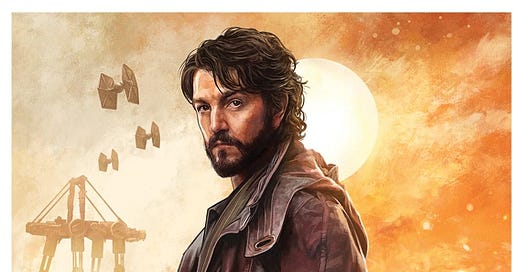



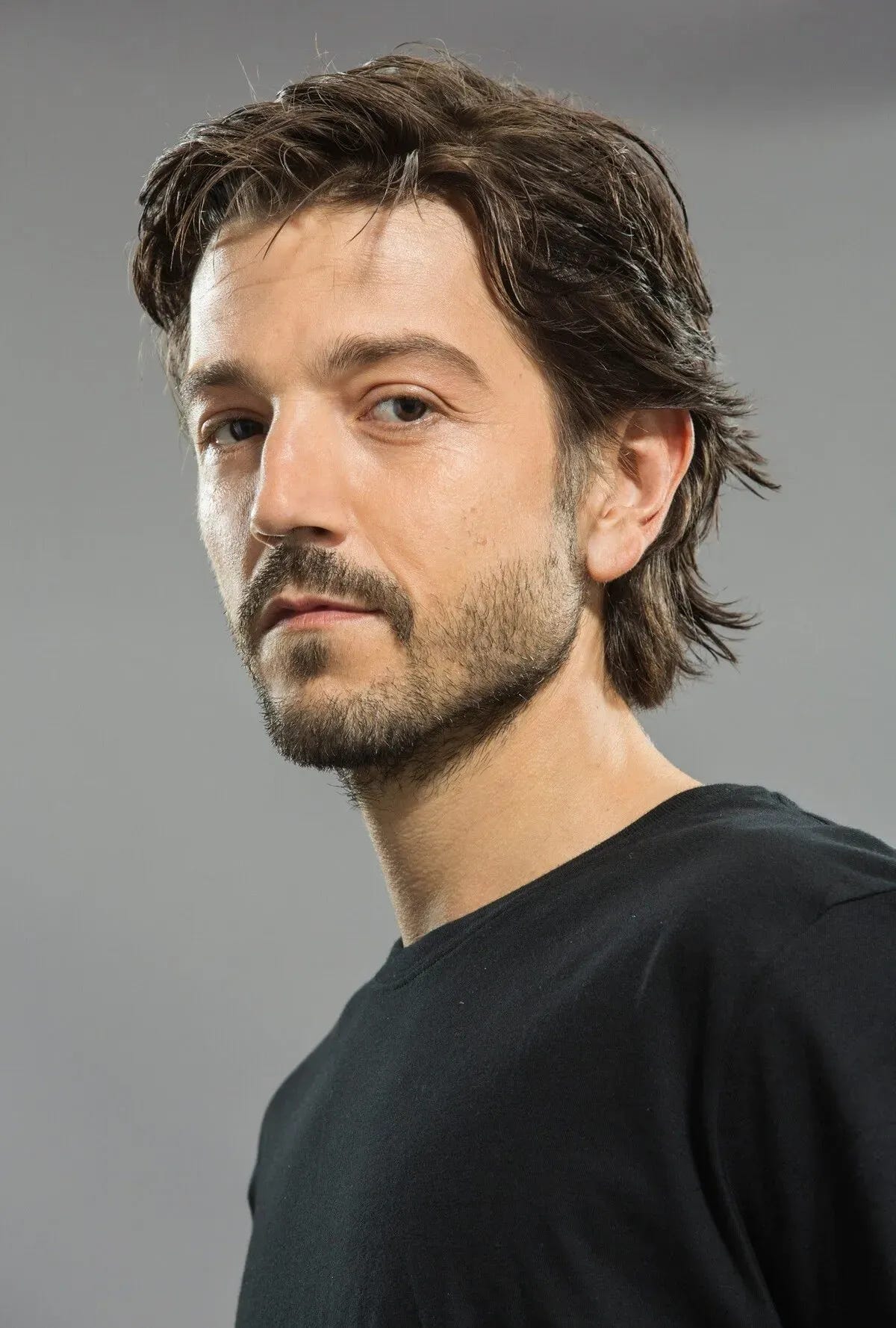
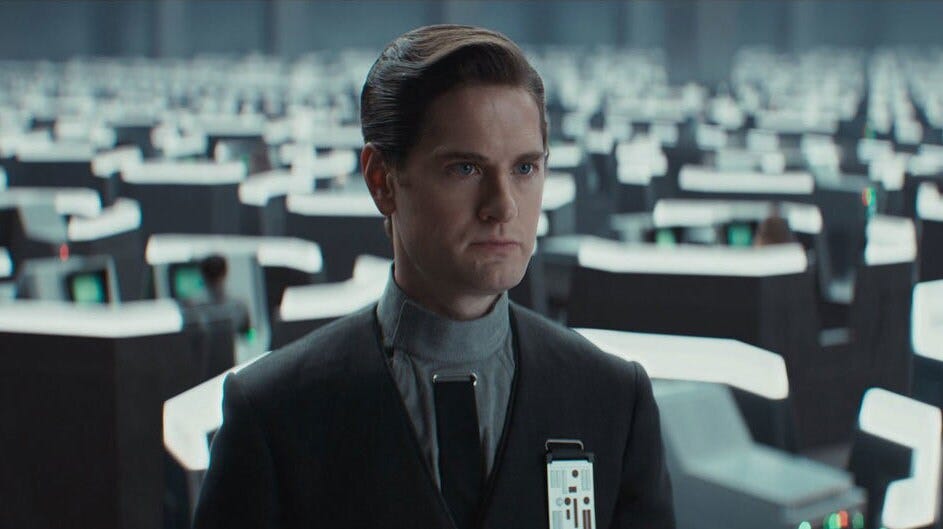
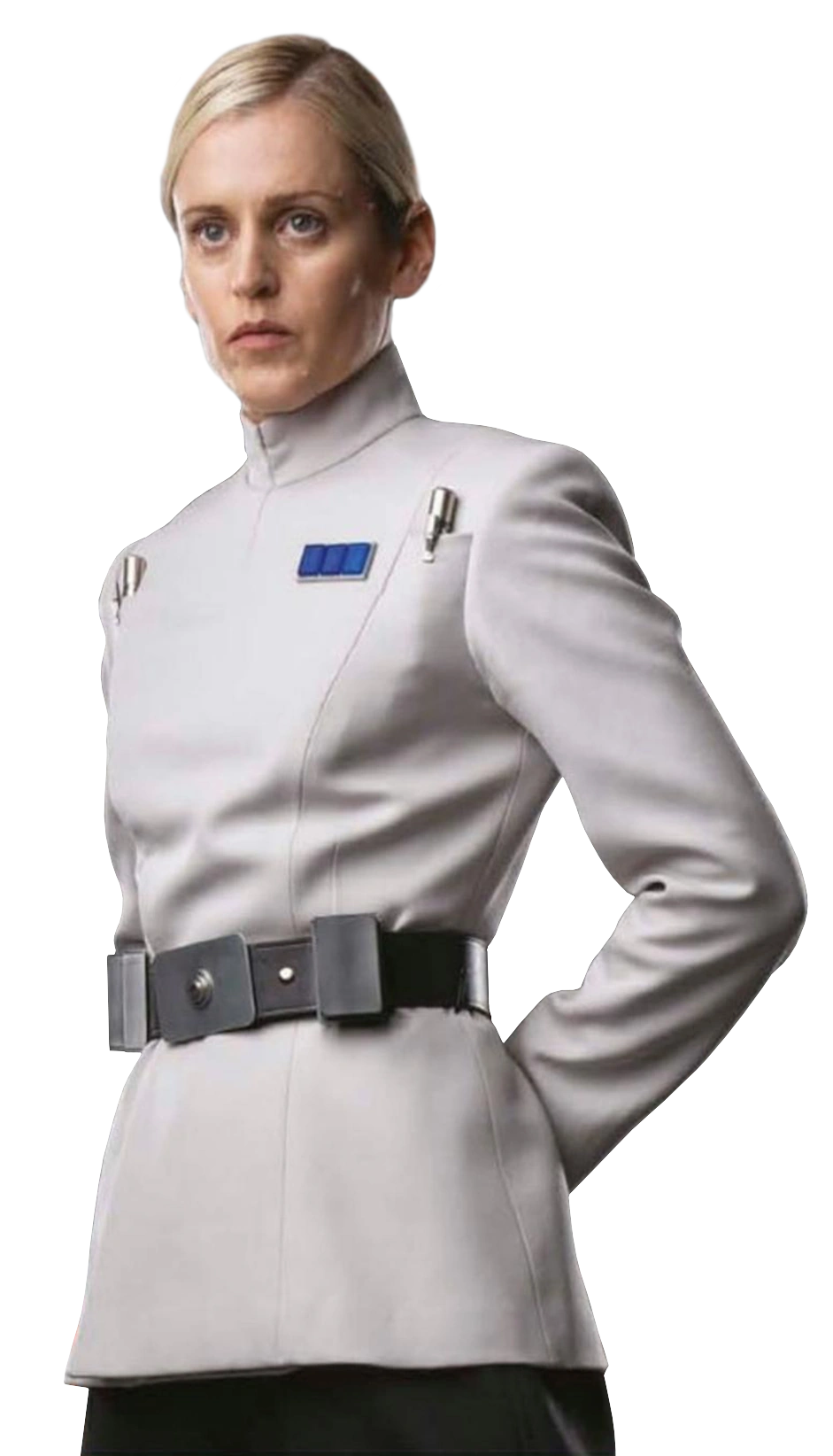
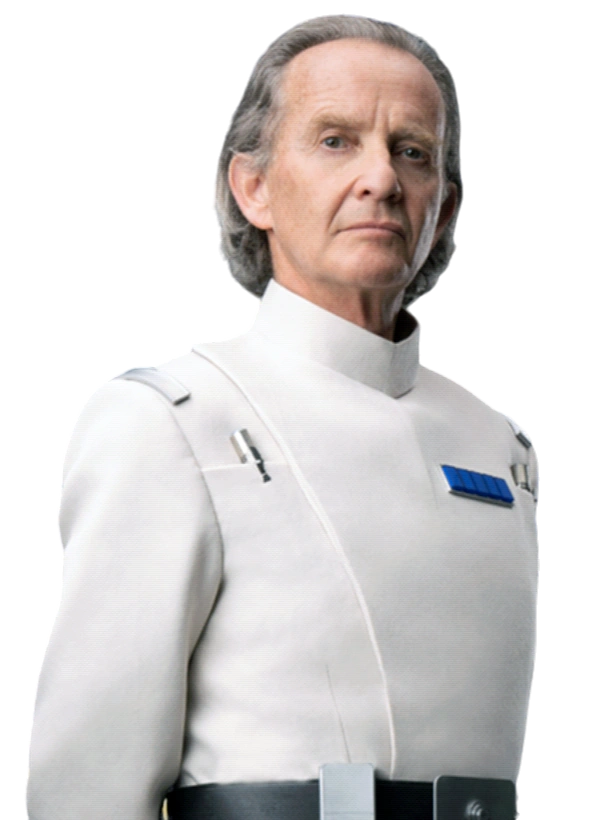
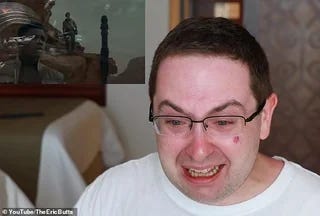
I’m quite a bit older than you, David, but my Star Wars experience closely tracks your own. The downward slide in the quality of the franchise, especially with the regrettable Boba Fett and Kenobi send-ups had left me completely indifferent to SW by the time Andor showed up. I saw a slick behind the scenes doc with the new studio surrounding screen they use to seamlessly create backing virtual worlds and I shuddered. Andor refreshingly dispensed with a lot of that. The worlds they built for Andor were real, hardscrabble, desaturated and downbeat. The story dispensed with the magical Jedi and a “force healer” is introduced only in episode 9 - as a quack, in Cassians view..
Such a great episodic in so many ways.
Good stuff, brother!